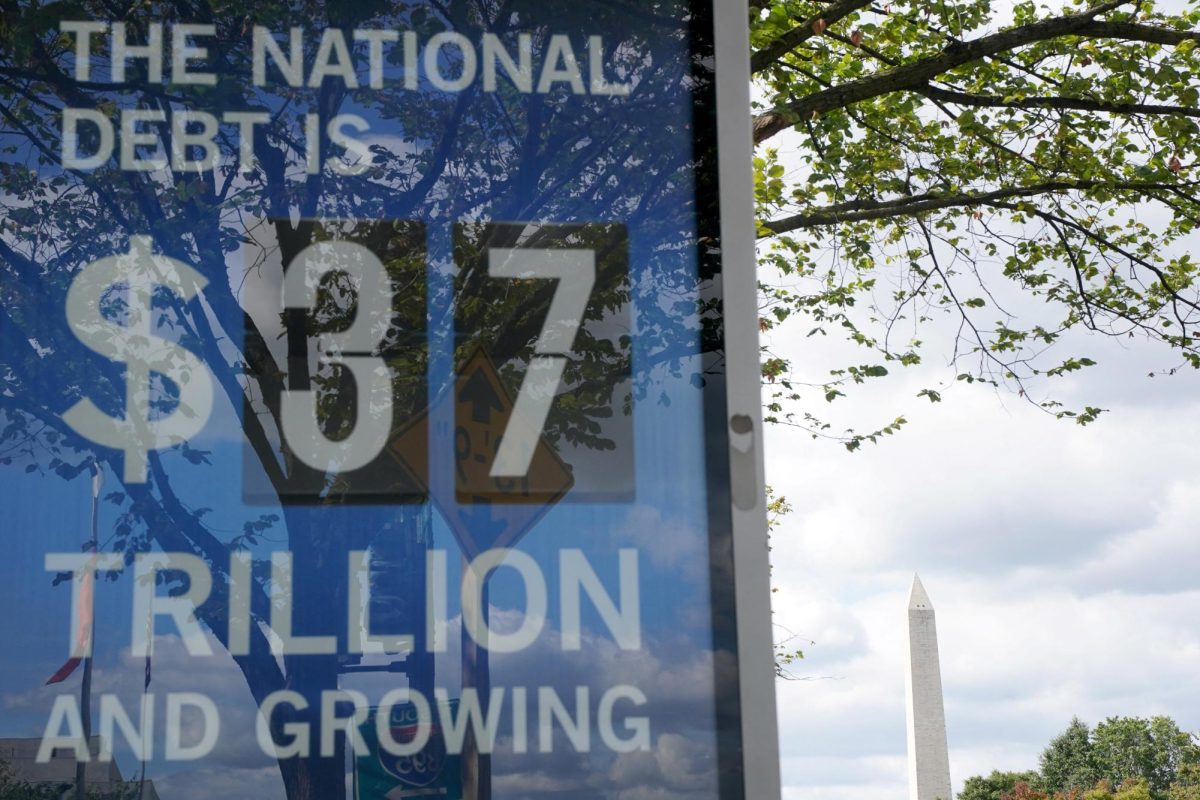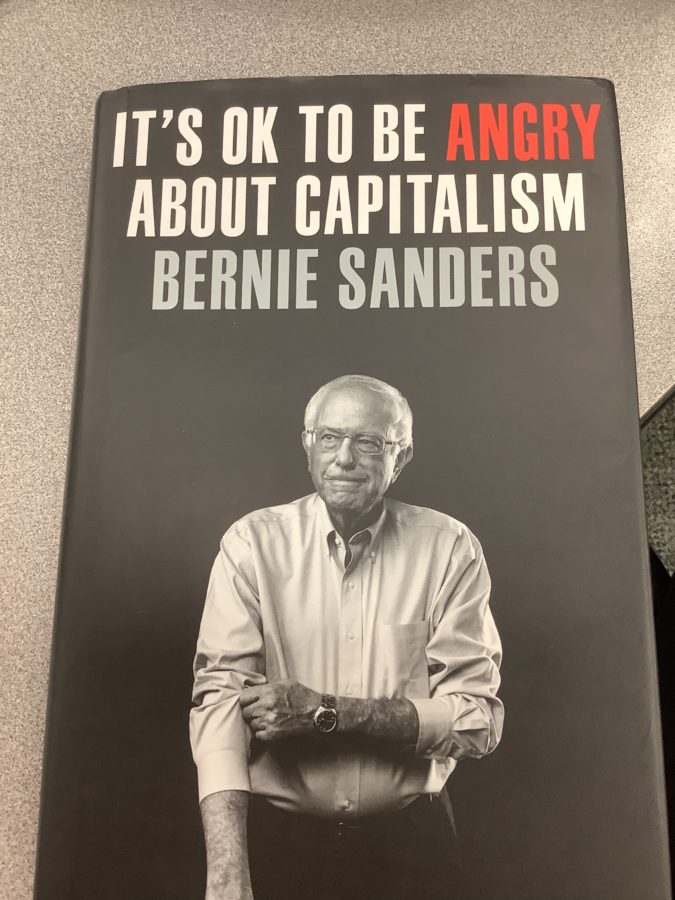Is It Ok To Be Angry At Capitalism?
Bernie Sanders recently released a new book giving a critique about a beloved economic system. Beloved by those who are benefiting from it, not so much from those who don’t.
As taught in my Sophomore year history class, continued in my Junior year history class, and reaffirmed in my Senior year history class:, communism is bad.
Throughout history, 94 million people died under communist governments. Even if many didn’t support the proxy wars of the Cold War, it seems obvious that capitalism is a better economic system than communism. Nearly nine million people died under the rule of the USSR, as well as most technological innovations coming from capitalistic societies, so why shouldn’t everyone love this system?. Some people believe this to the point of blinding themselves to the flaws of this system.
However, it needs to be said: even with all capitalism has done for the United States, is it ok to be critical about this economic system? In Bernie Sanders’ new book, “It’s Ok to be Angry About Capitalism,” Sanders addresses some of the failures of our beloved economic system.
Many say that capitalism breeds innovation and therefore helps the average American. Sanders’ calls into question how capitalism truly affects everyone and claims that this system serves the wealthy. He asserts that America is an oligarchy of those who have the financial resources to influence politicians and how the government is run to their own benefit.
“There is nothing more American than questioning the systems that have failed us and demanding the changes we need in order to create the kind of society that we and future generations deserve,” Sanders writes in the introduction of his book.
Sanders creates the context needed to visualize just how much wealth inequality there is in the United States. Three Wall Street firms: BlackRock, Vanguard, and State Street control assets worth over 20 trillion dollars and are the major stockholders in more than 96 percent of S&P 500 companies, generating massive amounts of wealth while not doing much to redistribute their wealth. During a time of great financial struggle for the average American, US billionaires became 62 percent richer during the pandemic.
“We’ve got to upend the lie we’ve been told for decades, the one that says: this is how the system works. This is how globalization works. This is how capitalism works. This is how employers and employees will always relate to each other,” wrote Sanders in reference to the price gouging as well as movement factories to developing nations with loose labor law decisions that companies made to maximize profits.
The top one percent own 92 percent of the wealth whereas the bottom 50 percent own two percent of America’s wealth. Considering the United States is the wealthiest nation in the world, why are we ok with this massive gap in wealth inequality? Because, Sanders affirms, the billionaires of America have the power to influence politics by donating large sums of money to campaigns and super-pacs for these candidates to vote in their favor.
With slogans during the 2020 Presidential election such as “Settle for Joe” and “Doesn’t Matter Who, Vote Blue,” raises questions about the reality of American politics and highlights problems within the Democratic Party, and those who typically vote non-republican. Why should we have to settle? Why should we vote for a candidate, not because we believe he is the best for running the country, but because he is the only one the DNC believe is capable of defeating the Republican candidate?
Sanders heavily details his presidential campaign as one of the largest grassroots campaigns and advocates for the younger generation to create a better future and America for them. But he ignores the fact that he is older than 80 years old. He highlights the votes he is getting in the primaries of the 2020 election, young people, “the future of our country”. As good as his intentions are, neither Bernie Sanders, nor Donald Trump or Joe Biden, are the future of our country. They are both far past the average age of American men, as well as not the best health, mentally and physically.
Sanders describes himself as an independent candidate, although votes in favor of the Democrats. Because of this, he is able to objectively see the ins and outs of Congress without being forced to conform to his party. Because of this objectivity he mentions sometime that is pretty apparent if you look for it: the failure of the Democratic Party.
“The danger for the Democratic Party is not being too bold. It’s being too cautious,” Sanders writes.
In January 2021, Democrats owned the House, Senate, and the Presidency, yet not much was done to maintain the promises many of them were voted in for. They used minimum wage and abortion rights to their advantage to garner votes, but once in office, they made little effort to follow through.
Many people voted for Obama for the hope he inspired, and a “yes we can” attitude. But once Democrats were in charge, minimum wage was not raised for workers, especially those working in rural areas. Many of these voters flipped their vote for Trump in the 2016 election, causing an unprecedented victory of an unlikely candidate.
Trump was new, he was different. During a time of no real changes for working class citizens, voters knew that they needed to vote for someone unique on the off chance that they made things better for them. People changed their political beliefs because of the lack of change and accountability held by the Democratic Party, and we have nobody to blame but ourselves.
Sanders also gives new perspectives and questions to think about in his book, including more controversial topics such as abolishing the electoral college and rethinking the Supreme Court.
“It is unacceptable and anti-democratic that a handful of unelected lifetime appointees exert the kind of political power that they do.”
This raises a good point and to add to it, the corrupt corporate pac money that is basically bribing politicians, along with the fact that former President Donald Trump is a billionaire, it is the elites of the country that are packing the court in their favor. It is also laughable if someone tries to argue that these judges are impartial.
Bernie Sanders calls attention to the average worker, and how they are paying more taxes (proportionally), working harder and longer, and still getting paid 400x less than the CEO’s that hire them. Sanders argues that we live in too advanced a country to live like this.
“Is it really too much, in the twenty-first century, in the wealthiest country on earth, to begin creating an economy in which people actually have some power over what they do for forty hours or more a week?” Sanders writes.
On tour to promote his new book, Bernie Sanders went to Los Angeles to speak about these topics and I was lucky enough to attend. During this talk, Sanders mentioned a wide range of topics about issues with our capitalistic system here in America.
To further his critique he brings up the advancement of technology, and how it should work for the workers, not the elites of the corporations. With AI and robots, these innovations should make our lives and jobs easier to complete, not steal away jobs.
“Technology is not a bad thing if it works for working people and not just the people who own the technology,” Sanders said during his event.
Sanders also brings up an interesting concept, taxing robots. At first this seems crazy and insane, if a robot isn’t making any income, why should the owner pay taxes? Sanders asks the question, should we tax based on labor or based on capital? If robots are taking our jobs, shouldn’t it be fair to tax the robots at the same rate as the workers they replace?
Moving on to the for-profit healthcare industry in America. An issue plaguing the US, and doesn’t seem to be an issue for other major countries is the lack of public funded healthcare. At the moment, over 85 million Americans are uninsured or underinsured and in reaction to this, 60,000 people die each year because they avoided going to the doctor or getting medical attention because they couldn’t afford it.
Many may argue that the reason that universal healthcare will never work in the US is our population size and how our hospitals will be overrun. To counter this argument, this means that people who are arguing against universal healthcare do not believe that everyone deserves insurance or to afford medical care. If everyone could get the medical attention they deserve even without universal healthcare then we would have the same problem. The medical system we have now relies on the fact that millions of people cannot afford the care they need.
The fact is, insurance companies are making billions of profit, over $60 billion, because of the pain and suffering of other people. If we change the system now, it will not work for the profit of the hospitals and insurance companies and instead work for the people, which will never happen because of the unrestricted corporate money that insurance and pharmaceutical companies can give to candidates and pacs.
“The ajar reason the current health care system in the United States is so expensive is that it operates on an Uber-capitalist model that is geared to the needs of insurance companies, not patients,” Sanders writes.
The average cost of an MRI scan in the United States is 1,119, $811 in New Zealand, $215 in Australia’s, and $181 in Spain. Why, in the most advanced and wealthiest country, are we burdening our citizens with exponentially more expensive medical procedures.
Whether the average person agrees with the sentiment of this book or not, it is clear that the status quo is not working for everyone. Real change needs to be made to make America a better and more advanced country. With the divisive nature of politics, it is easy for both sides to try and derail the progress being made that is not in their favor.
“When we are always fighting against those who would take us backward, it’s hard to find time to make the arguments for what needs to be done to go forward,” Sanders concludes.

Whenever there is a big new story, whether on campus or off, you’ll find Neve Walker at the heart of it. Neve is a senior at Cathedral, and in her second...





















































